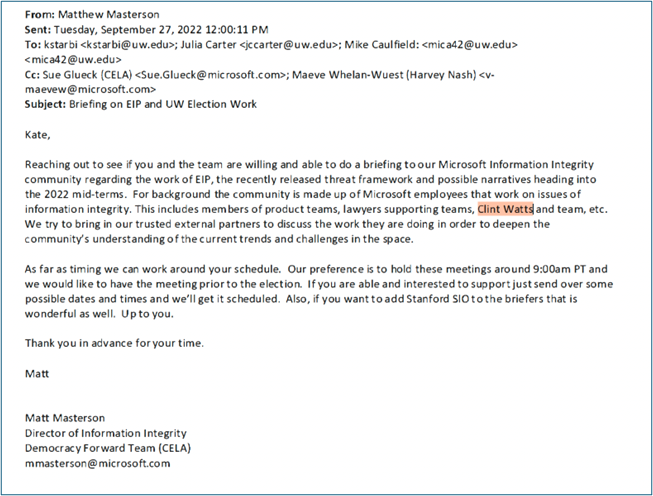Microsoft aims to smoothly transition from one presidential administration to the next. The company recently secured a major win in DC, receiving the official blessing of the President in a $500 billion AI investment partnership between SoftBank, Oracle, and Microsoft’s OpenAI. But as official policy turns against online censorship, the tech giant may have to confront its track record of deep involvement in the suppression of Americans’ online speech.
Newly uncovered evidence now shows that Microsoft served as the tip of the spear in the private sector in censorship-industrial complex – the coordinated effort between corporations, government agencies, NGOs and academics to restrict American speech.
Microsoft not only participated but actively funded and partnered with several key initiatives aimed at controlling online content, including the University of Washington’s Center for an Informed Public (CIP), and the DHS-born Election Integrity Partnership to which it belongs.
Records now show that many of the same government officials who spearheaded the most pernicious censorship initiatives between 2016 and 2020 later transitioned to top roles at Microsoft, where they continue to advance these efforts today under the company’s umbrella.
The Microsoft records show how the convergence of unchecked corporate power and government influence was used to suppress free expression and raises serious new questions about one of America’s most powerful companies’ commitment to the integrity of public discourse and preservation of constitutional rights.
Defending Democracy
Launched in April 2018, the Defending Democracy initiative was described as a collaboration between Microsoft, government agencies, think tanks, and academic institutions aimed at “safeguarding electoral processes.” One of its primary goals was to counter so-called “state-sponsored” disinformation campaigns and curb the spread of “junk news.”
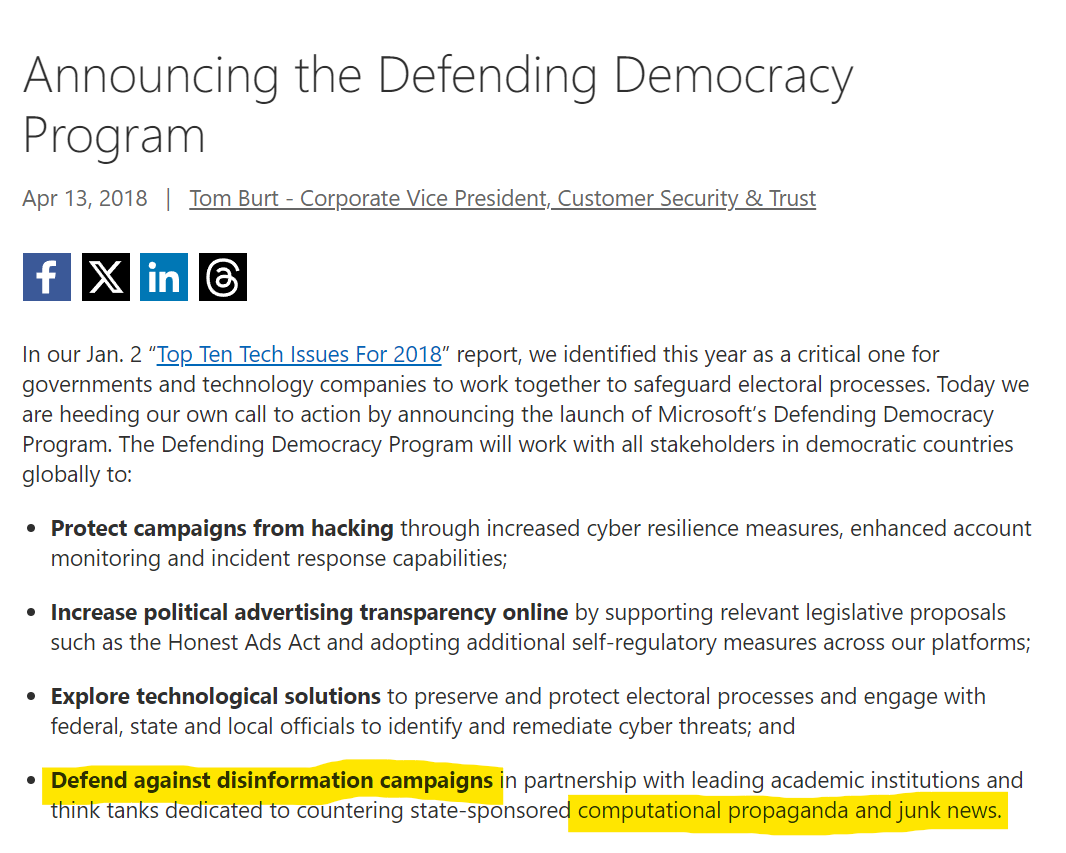
The initiative was announced by Tom Burt, Microsoft’s Vice President for Customer Security and Trust. While ostensibly focused on “customer security,” Burt’s portfolio appears to be primarily focused on managing Microsoft’s direct collaboration with top national security officials. White House visitor logs reveal that Burt has been a frequent visitor to the Biden White House, meeting with National Security Advisor Anne Neuberger at least four times between 2022 and 2024.
During Burt’s time in his role, Microsoft forged a partnership with Princeton Professor Jacob Shapiro, a political scientist and special advisor to the director of national intelligence.
Shapiro’s curriculum vitae shows that he has received at least $1.76 million in Microsoft funding for his work on misinformation and disinformation since 2018. He’s also received more than $11.76 million from a controversial Department of Defense program called the Minerva Initiative, a psyops research program focused on the containment of disfavored social movements and social contagions.
In 2013 for example, Minerva funded a study to analyze the risks of civil unrest from climate change.
In 2020, Microsoft researchers collaborated directly with Shapiro to study and analyze online “misinformation and disinformation narratives” related to COVID-19. Microsoft funded another Shapiro-led study the same year titled “Trends in Online Influence Efforts.” The study claimed to identify misinformation influence efforts (IEs) by several foreign actors, particularly Russia, on U.S. politics and political movements.
As seen elsewhere in the censorship industry, the scope of Shapiro’s work quickly expanded to cover not just alleged falsehoods, but also true-but-unwelcome information.
The study acknowledged that such IEs often didn’t involve misinformation at all, acknowledging that the IE’s often involved “promoting true content.” In fact, Shapiro and the study’s authors admitted that for purposes of the research, they had often expanded their definition of “deception” to include the “origin of the content as opposed to its veracity.”
The Shapiro study further alleged that conservatives and Trump supporters were disproportionately responsible for sharing “junk news” relying heavily on previous work by researchers at the Stanford Internet Observatory (SIO) and the Election Integrity Project (EIP). As discussed in more detail below, the EIP was created in 2020 to flag, suppress, and remove online speech.
Shapiro’s study also claimed that Russian influence operations sought to discredit Hillary Clinton, the Democratic Party, and even conservative critics of Donald Trump in 2016 — claims consistent with narratives heavily promoted by the Clinton campaign in the run up to the 2016 election. Another example cited by Shapiro was an alleged Russian influence operation involving over 600 Twitter accounts to support Roy Moore, a Republican candidate in Alabama’s 2017 special Senate election.
But this “Russian” influence operation would soon be the subject of a major political scandal after it emerged that it had been fabricated domestically by a group funded by none other than Microsoft board member Reid Hoffman.
Hamilton 68 founder hired by Microsoft
The 600 Twitter accounts referenced in Shapiro’s study were identified by Hamilton 68, a so-called “misinformation dashboard” of the Alliance for Securing Democracy.
Created by former FBI counterintelligence official Clint Watts, Hamilton 68 claimed to be a central tool for identifying supposed Russian influence operations, but its credibility collapsed after journalist Matt Taibbi published the Twitter Files which revealed internal Twitter documents showing that Hamilton 68’s methodology was deeply and irreparably flawed.
The documents showed that Twitter officials complained internally that most of the accounts flagged by the dashboard were “neither strongly Russian nor strongly bots.” Yoel Roth, then Twitter’s head of trust and safety, blasted Hamilton 68 in internal emails, saying the dashboard was “actively damaging” and promoted “polarization and distrust through its shoddy methodology,” he wrote. “Real people need to know they’ve been unilaterally labeled Russian stooges without evidence or recourse.”


“In layman’s terms, the Hamilton 68 [investigation] barely had any Russians. In fact, apart from a few RT accounts, it’s mostly full of ordinary Americans, Canadians, and British,” Taibbi said at the time. “It was a scam. Instead of tracking how ‘Russia’ influenced American attitudes, Hamilton 68 simply collected a handful of mostly real, mostly American accounts, and described their organic conversations as Russian scheming.”

Despite the revelations, the withering criticism of Hamilton 68, and the ignominious shuttering of the “misinformation dashboard,” Watts was nevertheless hired Microsoft in July 2022 after the company acquired his cyber threat analysis firm, Miburo. The acquisition was announced by Burt.
Today he serves as General Manager of the Microsoft Threat Analysis Center (MTAC), a team tasked with “disrupting threats to democracies worldwide.”
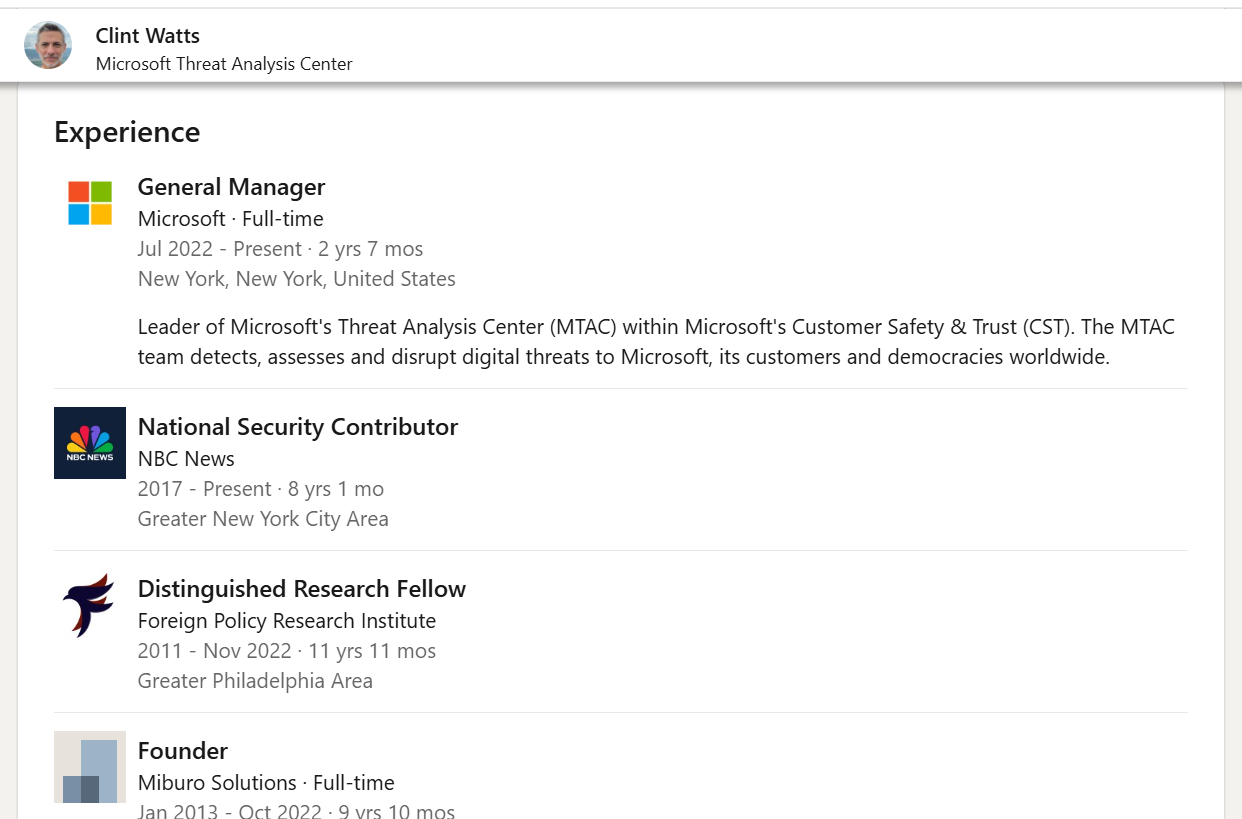
While Hamilton 68’s claims about Roy Moore were thoroughly discredited, another blatant disinformation effort to damage his campaign was exposed which was ironically funded by Reid Hoffman, a Microsoft board member.
Called “Project Birmingham,” the online disinformation effort involved operators funded by Hoffman who posed as conservative Alabama voters online and encouraged Republicans to support write-in candidates instead of Moore.
An internal report from the operators leaked to the New York Times noted that the team even “orchestrated an elaborate ‘false flag’ operation that planted the idea that the Moore campaign was amplified on social media by a Russian botnet.”
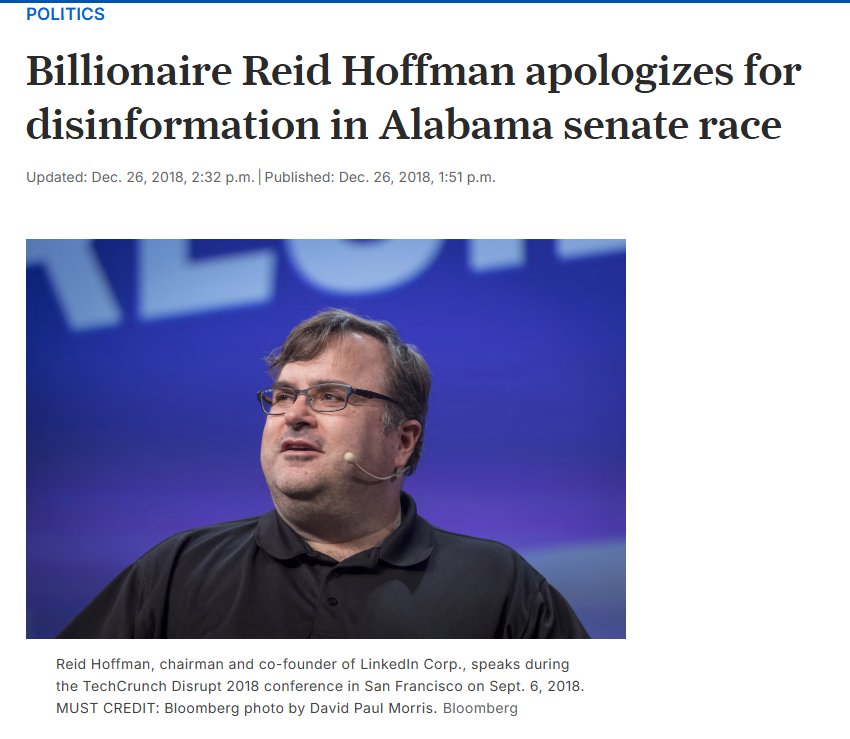
Democracy Forward
Launched alongside Defending Democracy, Microsoft’s Democracy Forward program is focused on addressing “democratic stability” by promoting a “healthy information ecosystem” and enhancing media literacy. Ginny Badanes, who heads the initiative, has worked closely with academic institutions and other stakeholders to advance the fight against mis- and disinformation.
The lines and responsibilities between the Defending Democracy and Democracy Forward programs are often blurred, and the record shows that the two programs’ mis- and disinformation activities often overlap.
For example, Democracy Forward also works closely with Princeton’s Jake Shapiro. In July 2020, Shapiro teamed up with Democracy Forward and Microsoft researchers to “trace the digital fingerprints of disinformation” on Twitter. Praising the Microsoft team as the company’s “internal good ideas fairies,” Shapiro called the partnership a “productive relationship” to jointly address misinformation.
Badanes, who has her own booking agent, has been a regular panelist and speaker at the Federal Election Commission, Aspen Institute, German Marshall Fund, and dozens of other “misinformation” and election integrity events. She and other members of Microsoft’s Democracy Forward team have also been frequent visitors to the White House.
The disclosures and frequency of meetings raise troubling new questions about how closely the Redmond software giant was coordinating its censorship activities with senior White House national security officials. Visitor logs show that Democracy Forward executives logged at least ten White House visits since 2022, often meeting with Biden’s top national security and homeland security officials.
For example, Badanes met at least twice with Caitlin Durkovich, an NSC advisor on homeland security issues. She was joined at the meetings by members of the Coalition for Content Provenance and Authenticity, a Microsoft-founded coalition of tech companies created in 2021 with the goal of “combating misleading content” by creating technical standards to certify the source of media content. Visitor logs show she was joined at one of the meetings by Andrew Jenks, a Microsoft Azure Security executive who chairs the Coalition.
Microsoft censorship funding: The Center for an Informed Public (CIP) at the University of Washington
On December 3, 2019, the University of Washington launched the Center for an Informed Public (CIP), which would go on to become one of the four members of the Election Integrity Partnership. Cofounded by political science professor Jevin West and Kate Starbird, a data science professor, CIP was described as an effort to “bring together diverse voices from across industry, government, nonprofits, [and] other institutions” to “translate research about misinformation and disinformation into policy.”
West has received at least $960,000 in funding from Microsoft since 2015. Starbird received $250,000 from Microsoft in 2022 to support “rapid response research to disinformation around U.S. elections.” According to her CV, she has also received at least $4.4 million in taxpayer funding from the National Science Foundation and the Office of Naval Research for misinformation and disinformation research.
Notably, the Office of Naval Research executes the program grants for the Minerva Initiative, the DoD’s psychological operations research program, which suggests that like Shapiro, Starbird has also been a frequent beneficiary of the DoD’s psyops research funding.

In addition to funding West and Starbird directly, Microsoft has also provided financial support to CIP, although the specific amounts are not disclosed. The relationship between CIP and Microsoft appears to be extraordinarily close however, and the company and academic center have partnered on several initiatives related to mis- and disinformation since its 2019 founding.
For example, West and Starbird are frequently invited to give lectures to Microsoft according to their CVs.[1] In 2019, Starbird was invited to Microsoft for a talk titled “Muddied Waters: Online Disinformation during Crisis Events.” In 2020, CIP and Tom Burt’s Defending Democracy program hosted a series of “workshops” warning about the serious growing threat of “deepfakes” in the 2020 elections. Several subsequent analyses since 2020, including a 2024 analysis by MIT Technology Review have concluded that the threat of deepfakes in the elections was wildly overblown.
In 2022, West interviewed Microsoft President Brad Smith about Russia’s use of cyberattacks in the Russia-Ukraine war. “I think that disinformation in particular is one of the existential threats to democracy,” Smith told the audience.
That same year, West emailed Ginny Badanes, the head of Microsoft’s Democracy Forward initiative to recruit her to sit on the board of a new CIP initiative called Co-Designing for Trust, a digital literacy project to “help individuals understand and respond to the ways in which misinformation exploits our minds, emotions, and social circumstances.” In August, West informed Badanes that the project had received funding from the National Science Foundation.
The Election Integrity Partnership (EIP)
Microsoft’s close affiliation with Starbird is particularly problematic as she has been at the epicenter of the censorship industrial complex. In the run up to the 2020 elections, Starbird headed a since-dissolved Department of Homeland Security (DHS) panel at the Cybersecurity and Infrastructure Security Agency (CISA) called the “Protecting Critical Infrastructure from Misinformation and Disinformation Subcommittee” (the “MDM Subcommittee”) that directly pressured social media companies on their content moderation policies.
In 2020, Starbird and CIP teamed up with the State Department, CISA, the FBI, and the Stanford Internet Observatory (SIO) among others to create the Election Integrity Partnership (EIP), a new initiative to flag, suppress, and remove online speech in coordination with big tech companies. The EIP’s flagging efforts had a massive impact on the 2020 election.
A November 2023 staff report released by the House Judiciary Committee, concluded that the EIP censorship efforts were so aggressive that they even pressured social media companies to censor true information, political opinions, and even jokes.
According to the staff report, the pressure was also largely directed in a way that benefitted Democrats: true information posted by conservatives was labeled as “misinformation” while false information posted by liberals was largely unreported and not subject to censorship.
Starbird, who elsewhere has argued that social media “content moderation is free speech, not censorship,” has focused primarily on what she believes is the disinformation threat posed by the populist right on social media who support Donald Trump in the U.S., Jair Bolsonaro in Brazil, or Marine Le Pen in France.
Moreover, internal privileged documents released as part of a freedom of information request now reveal that the EIP was established at the behest of the federal government to do what the government was explicitly prevented from doing: pressuring social media companies to censor thousands of First Amendment protected posts that CISA deemed unacceptable.
Responsibility for election information security is divided across government offices: CISA has authority to coordinate on cybersecurity issues related to the election, the FBI to investigate cyber incidents and enforce election laws, and intelligence agencies to monito r for foreign interference, yet no government agency in the United States has the explicit mandate to monitor and correct election mis and disinformation. This is especially true for election disinformation that originated from within the United States, which would likely be excluded from law enforcement action under the First Amendment and not appropriate for study by intelligence agencies restricted from operating inside the United States. As a result, during the 2020 election, local and state election officials, who had a strong partner on election-system and overall cybersecurity efforts in CISA, were without a clearinghouse for assessing mis- and disinformation targeting their voting operations. The students approached SIO leadership in the early summer, and, in consultation with CISA and other stakeholders, a coalition was assembled with like-minded partner institutions.
In fact, as the House Judiciary staff report noted, other Microsoft internal documents show that in early 2020, Chris Krebs, the director of CISA at the time and a former Microsoft director of cybersecurity policy until 2017, was already thinking about how to reorient CISA censorship efforts from foreign adversaries to domestic actors.
A February 2020 email from Brian Scully, CISA’s head of the Countering Foreign Influence Task Force (CFITF) inviting SIO’s Renee DiResta to a meeting hosted by Krebs include a list of agenda items including “How should we be thinking about domestic vs. foreign interference?” and “Any low hanging fruit we can work with platforms on?”
A month later in March, Krebs participated in a “broad stakeholder conference call” with Microsoft and other participants about how CISA could take a more active role in surveillance and censorship regarding activities related to COVID-19. Internal Microsoft notes from the call obtained by the House Judiciary Committee revealed that “monitoring disinformation” and working with “social media organizations, as well as state and local governments to clarify and combat misinformation” were key topics.
The record shows that Microsoft continued working closely with Starbird as late as the fall of 2022. Emails released as part of a public records request by Racket News reveal that in October 2022, Starbird provided a briefing to as many as 100 Microsoft employees working on “issues of information integrity.”
An October 10, 2022 email from Microsoft’s Matthew Masterson thanked Starbird for participating in the meeting and asked if she would be sure to “discuss the work of UW/EIP and its partnership with Microsoft.” Other emails from Masterson to Starbird noted that Clint Watts, the founder of the disgraced Hamilton 68 and now a Microsoft executive would also be at the meeting.
Watts and Starbird had been close collaborators on “misinformation” activities since early 2021. In April of that year, Watts invited Starbird to an “off the record” roundtable hosted by the “new [Biden] administration” to improve “societal resilience to disinformation and misinformation.”
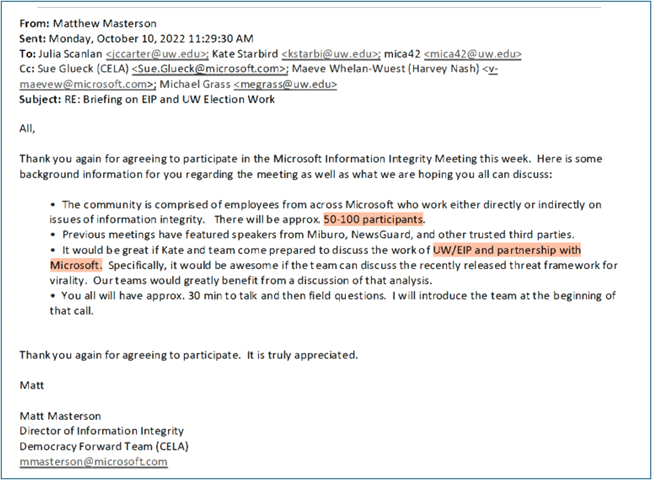
Microsoft and CISA
Matthew Masterson, currently Microsoft’s “director of information integrity,” is a deep state alum of the censorship industrial complex, serving in a variety of roles across the Federal government including Senior Cybersecurity Advisor at the Department of Homeland Security (focused on “election security”), as well as the Election Assistance Commission.
Hired by Microsoft in January 2022, he also previously worked at the Stanford Internet Observetary, a major online censorship hub that participated in the DHS-created Election Integrity Partnership, the most influential group that worked to censor the 2020 election.
In 2021 Masterson was asked by New York Times reporter Shira Ovide what government officials and Internet platforms had done to stop disinformation from having a material impact on the 2020 election.
“Happy to talk regarding the work we (the feds) did in coordination with social media companies to anticipate and respond to efforts to undermine the election,” Masterson emailed Ovide.
Masterson’s response suggested that CISA was in close contact with platforms like Twitter throughout the 2020 election cycle.
Other communications from Masterson further illustrate his strong advocacy for government snooping on social media. After joining Microsoft in February 2022, Masterson exchanged text messages with DHS Director and former NSA official Jen Easterly, addressing her concern that DHS needed to improve its collaboration with social media platforms to “pre-bunk” and “de-bunk” misinformation.
“Platforms have got to get comfortable with gov’t” Masterson replied. “It’s really interesting how hesitant they remain.”
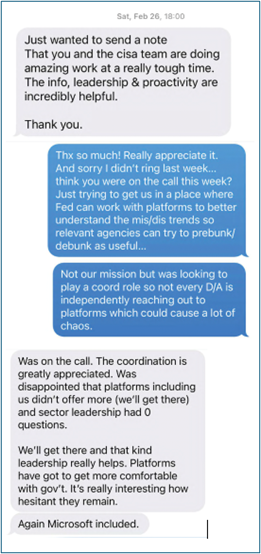
Source – Lee Fang
Masterson is also remembered as the architect of one of DHS’s most controversial censorship debacles: the creation of the Disinformation Governance Board (DGB).
In July 2021, Masterson coauthored an op-ed for the Virality Project—a Stanford Internet Observatory (SIO) project focused on combating COVID-19 misinformation—titled “The Case for a Mis- and Disinformation Center of Excellence.”
In the article, Masterson proposed the establishment of a government entity explicitly tasked with “reducing the supply of mis- and disinformation by making it less prevalent in our information spaces.” He advocated for this new task force to be housed within CISA where it would be empowered to exercise broad federal oversight over the dissemination of information, particularly on social media platforms.
Masterson also appears to have been in regular contact with the White House as the DGB was being formulated. Just one month prior to him publishing the oped, he met with White House NSC official Puneet Khan and CISA MDM Chief Brian Scully. The details of the meeting aren’t known but he was joined by SIO founders Alex Stamos and Adriana Stephan.
The SIO was ultimately shuttered in 2024 after several congressional investigations determined that it had been coopted by the federal government to “monitor and censor American’s online speech” in advance of the 2020 election.
Masterson has continued his censorship crusade since joining Microsoft. In November 2023, he testified at an AI forum sponsored by Sen. Chuck Schumer (D-NY) about the dangers of misinformation.
Masterson told the Senator that Microsoft had implemented new tools as part of Bing generative AI search including classifiers, metaprompts, provenance tools, and enhanced reporting functionalities to “prohibit… using these services to create or share information that is fraudulent, false, or misleading.” Left unsaid is who or what would determine the truthfulness of the information.
Microsoft’s role in the Disinformation Governance Board
On April 27, 2022, the DGB was announced during a 2023 budget hearing before the House Appropriations Subcommittee on Homeland Security. The board lasted just three weeks before it was disbanded following a national outcry from policymakers, opinion leaders, the media and First Amendment advocates.
The controversy centered on President Biden’s decision to appoint Nina Jankowicz as the head of the DGB. Jankowicz, a writer and commentator with far-left views, had previously promoted the widely discredited claim that Donald Trump colluded with the Russian government to win the 2016 presidential election. She also publicly suggested that the Hunter Biden laptop story was part of a Russian disinformation campaign.
The public record shows that Tim Maurer, another current top Microsoft executive was also heavily involved in the establishment of the DGB and interfaced often with Jankowicz as the DGB was being formulated. Maurer who was hired by Microsoft in December 2023 as a senior director for cybersecurity policy, previously served as a DHS political appointee and later as a top official on the White House National Security Council (NSC).
Although heavily redacted, FOIA logs released by the DHS in 2022 reveal several exchanges in which Maurer discussed issues related to the “Disinfo Gov Board Steering Group,” and other exchanges with Jankowicz.
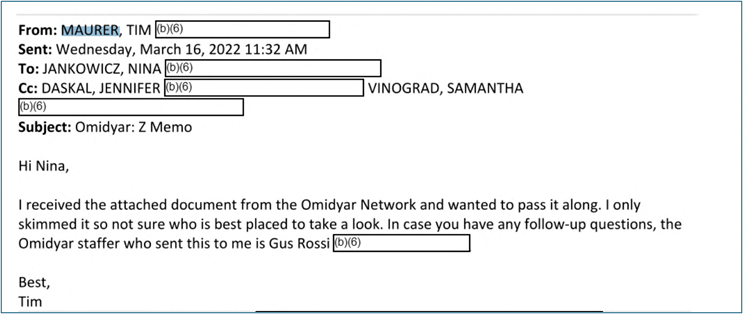
Visitor logs reveal that on January 29, 2024, just one month after joining Microsoft, Maurer returned to the White House for a meeting with the Office of Science and Technology Policy. The purpose of the meeting is unclear, but he was joined by Biden Administration officials from the Departments of Energy and Education, and the National Science Foundation among others.
FFO has compiled a list of Microsoft’s meetings with the previous administration that can be accessed here.

